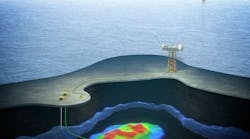Funds of $4 billion allocated by the Nigerian government to the Niger Delta for its development over the last 4-5 years have been swallowed up by increased governmental staff wages, security, and corruption, a senior official said.
Speaking at the Offshore West Africa conference, E. Utuama, deputy governor for Delta State, said staff numbers in government posts had risen because there weren’t any jobs in the private sector. “Everyone is looking for a job,” Utuama said.
But Nigeria should form an Inspector General’s office to monitor sustainable development projects in the Niger Delta and help quell the unrest that is blocking oil and gas production, said Stephen Benstowe, a Niger Delta community relations advisor, at the conference session looking at sustainable development in that area.
Timely release of funds for development in the Niger Delta was critical, said Benstowe, who also has provided advice to the Bonny Island community that hosts the Nigeria LNG plant. The problems in the region can be blamed on government inaction and insincerity from oil companies with their sustainable development policies, Benstowe said. Operators are failing to integrate and engage with the communities. “Who is responsible for sustainable development in Nigeria? It has earned $20 billion/year over the last 4 years from oil, and there are 20 million inhabitants in the Niger Delta who live in abject poverty and are grossly neglected.”
The government has formulated the Niger Delta Master Plan to reduce poverty, diversify the economy, improve health and develop new transport, communications, and waste management facilities. So far, militants and residents from the region have complained bitterly about its poor implementation.
Community Development Foundations, where communities and oil companies work together to address their needs, have had some success, said Anthony Bolarin, general manager of sustainable development at Elf Petroleum Nigeria Ltd. “There have been lots of national development plans proposed before, and if we’re not careful there will be another one. Things have started to be built, but haven’t finished or those that have finished have been grassed up.”
Bolarin said global memorandums of understanding have been a failure in spearheading development in the Niger Delta. “We need to let the community come back to the center and ask them what they want. We must stop dictating to them,” he said.

